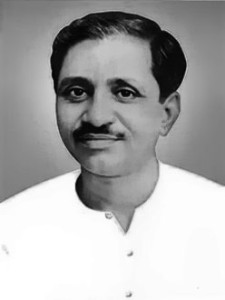
The omnipresence of Pandit Deendayal Upadhyaya ji’s images in offices of the Rashtriya Swayamsevak Sangh and in other patriotic organizations where nationalist thoughts are propagated, might confound a naive bystander or a political novice. One might wonder why there is such reverence among nationalists, even after nearly five decades of his unfortunate death. This piece attempts to shed light on a few of his principles and thoughts, that are eternal, and are as relevant in today’s contemporary and emerging India as they were in the stagnant socialist era of the 1960s.
Pandit Deendayal ji was a critique of both capitalist individualism and Marxist socialism. He formulated a new philosophy – Integral Humanism – that blended the best elements of bharatiya and foreign schools of thought, and championed individual liberty and holistic progress. He believed in all-round development of an individual, steeped in tradition but embracing modernity. In his own words, as cited in Chetan Bhatt’s 2001 book – “Humankind has four hierarchically organized attributes of body, mind, intellect and soul which correspond to four universal objectives, kama (desire or satisfaction), artha (wealth), dharma (moral duties) and moksha (total liberation or ‘salvation’)”. This espousal of simultaneous and integrated development of human beings, drawing from our scriptures, and linking to overall societal well-being was novel in its times, and has since been the guiding philosophy for the erstwhile Bharatiya Jana Sangh and now the Bharatiya Janata Party.
Articulating his views further, Pandit Deendayal ji said “Capitalism and socialism both differ in their view of property, but lead to its centralization and monopolization”. Just last week, I read legendary venture capitalist Peter Thiel’s counter-intuitive but hugely popular new book “Zero to One”, where his central thesis is “Contrary to public perception, capitalism and competition are opposites. Capitalism is premised on the accumulation of capital (he uses the phrase “monopoly capitalism”), but under perfect competition, all profits get competed away.” Thiel excoriated “socialist breadlines” elsewhere in the book. Aren’t these thoughts of Peter Thiel in September 2014, being labelled “completely new” and “refreshing” by many (including Mark Zuckerberg) today, and those of Pandit Deendayal Upadhyay ji in the 1950s and 1960s remarkably similar?
Moreover, in yet another contrast to the conventional wisdom of his era, Pandit Deendayal ji said “We need a system in which man’s own initiative remains unobstructued but in which, in his relation with the rest of society, human values do not suffer. People’s freedom and initiative to undertake entrepreneurial activities should never be abolished in any phase of planning”. The profoundness of this message is worth highlighting. While today, even in 2014, we are still trying to emerge from the aftermath of the stifling license control raj and curbs on liberty, here was a man who championed people’s freedom and initiative, even while the pernicious impact of such controls was yet to be fully understood.
Our beloved Hon’ble Prime Minister Shri Narendra Modi ji gave a clarion call to the world – “Make in India” – for indigenous manufacturing from the ramparts of the historic Red Fort on Independence Day. And today, barely a month later, in a glittering function, a suite of announcements were made, to foster entrepreneurship and accelerate manufacturing & industry in India, with a particular focus on micro, small & medium-scale enterprises and entrepreneurs. Deendayal ji, a passionate proponent of decentralization and self-reliant small-enterprises must be smiling from his heavenly abode today.
Finally, Pandit Deendayal ji’s views on a potential conflict between the institutions one builds and principles one holds most dear, are worth expounding upon. He once said “Why should we have a mad love for an institution because it is built up by us? When even an organization built up by us acts contrary to national interests, it is Dharma to destroy it”. In a day and age, where politics of convenience seems to triumph over long-held principles, these words are a timely reminder of not letting our moral compass and principles go astray.
In summary, I would strongly recommend that we study Pandit Deendayal ji’s life in depth, internalize his messages and pay him a fitting tribute that he deserves. A scholar and an organizer par excellence who has established many institutions yet never remained dogmatic about them, Pandit Deendayal ji’s teachings continue to inspire us as we carry out our national duties. I offer koti koti pranaams to this rashtraputra!
Download as PDF
Note: This article is contributed by our facebook group (Papertyari) member Kaushal Kishore Sharma.